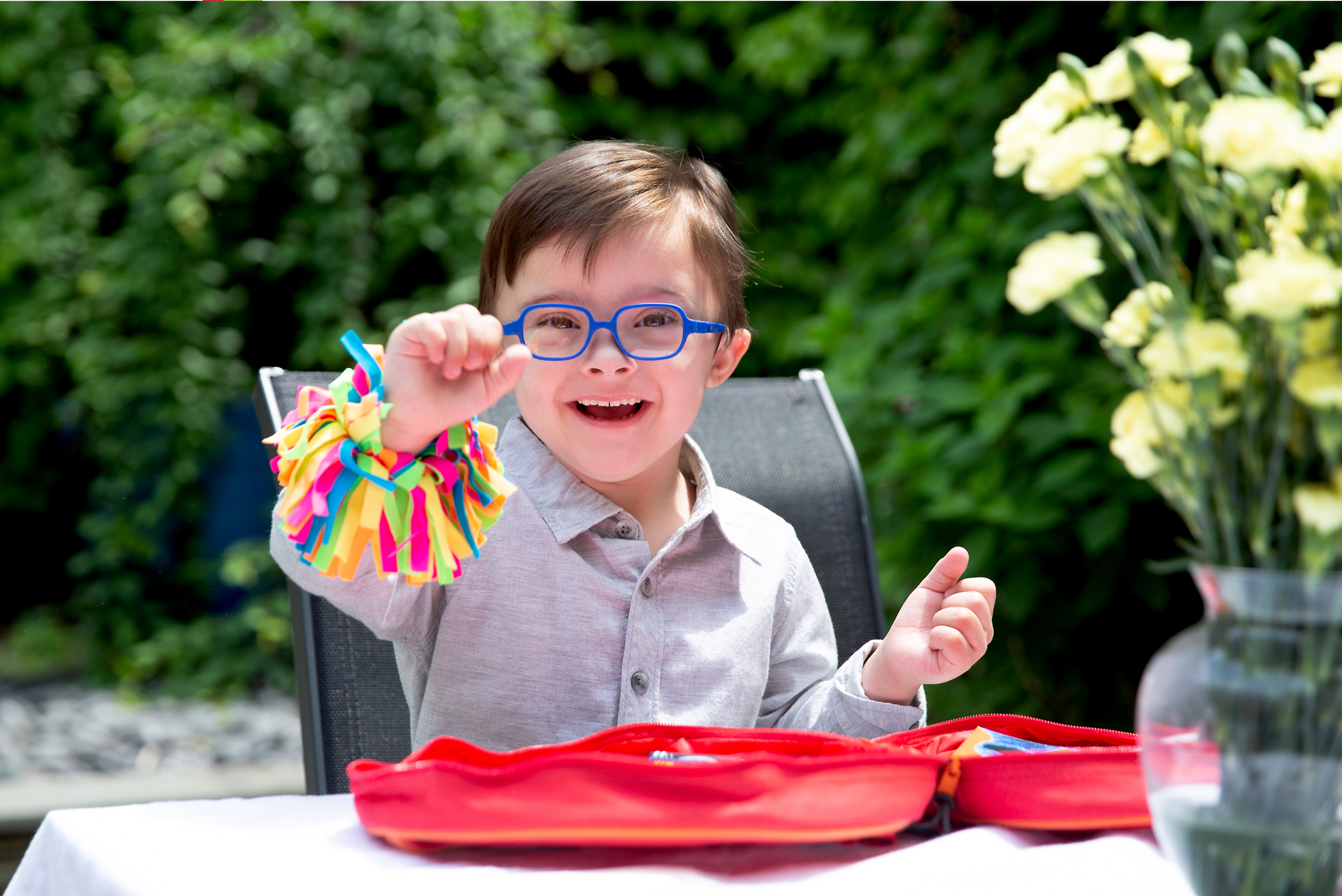Lisa Radcliffe ’86 and Punkinfutz bring the world of play to children with adaptive needs
Everyone has a Superpower
Lisa Radcliffe ’86 and Punkinfutz bring the world of play to children with adaptive needs
September 1, 2021
By
Sara Piccini
Scroll through the website for PunkinFutz — a Brooklyn-based company that makes adaptive toys and accessories for children with disabilities — and you’ll find the standard FAQs about shipping and returns, followed by a final question: What is the airspeed velocity of an unladen swallow?
Clearly, this is no ordinary company.
PunkinFutz, founded by Lisa Radcliffe ’86 and her husband, David Kramlich, in 2016, combines a seriousness of purpose with a sense of whimsy. (Fans of “Monty Python and the Holy Grail” will of course know the response to the swallow question: European or African?) The company’s name is a tribute to Radcliffe’s father, who coined the term “PunkinFutz” as a moniker for Radcliffe and her brother.
Radcliffe’s mission is to bring the world of play to kids who are often cut off from it. “It’s very clearly known that creative play is instrumental to the development of a child, intellectually and socially. And those play opportunities are often inaccessible to children with disabilities,” she says.
Dedicated to employing people from the community PunkinFutz serves, Radcliffe is also transforming the lives of adults with disabilities. “It’s metamorphic in every way,” says Shenik Ruiz, the company’s marketing communications coordinator, who has cerebral palsy. “The company is changing how society views disability by showing our value.”
The company itself is now poised for transformation. Partnering with Sesame Street, PunkinFutz launched a line of products at the end of July featuring familiar Sesame characters such as Big Bird, Elmo and Count von Count, sold exclusively at JCPenney online.
“There’s something so fundamental and comforting about those characters,” Radcliffe says. “It was everything coming together at the right time.”
‘Someone should do that'
Radcliffe’s inspiration for PunkinFutz grew out of her own experience raising two children with adaptive needs, her daughter Maddie, 25, and son Buster, 12.
“Buster was born at 26 weeks, so he was a micro-preemie,” Radcliffe says. As a toddler, he was fitted with heavy plastic orthotics to help him overcome neuromuscular challenges. “They looked like medieval torture gear. The kids on the playground were afraid of him.” Radcliffe was also concerned Buster might injure other children if he accidentally bumped into them.
“I realized that so much of what I had gone through with my daughter hadn’t changed,” she says. “The therapeutic things that kids needed still didn’t exist.” As she explains, most products were utilitarian and ugly, made for the long-term care market and produced by medical supply companies.
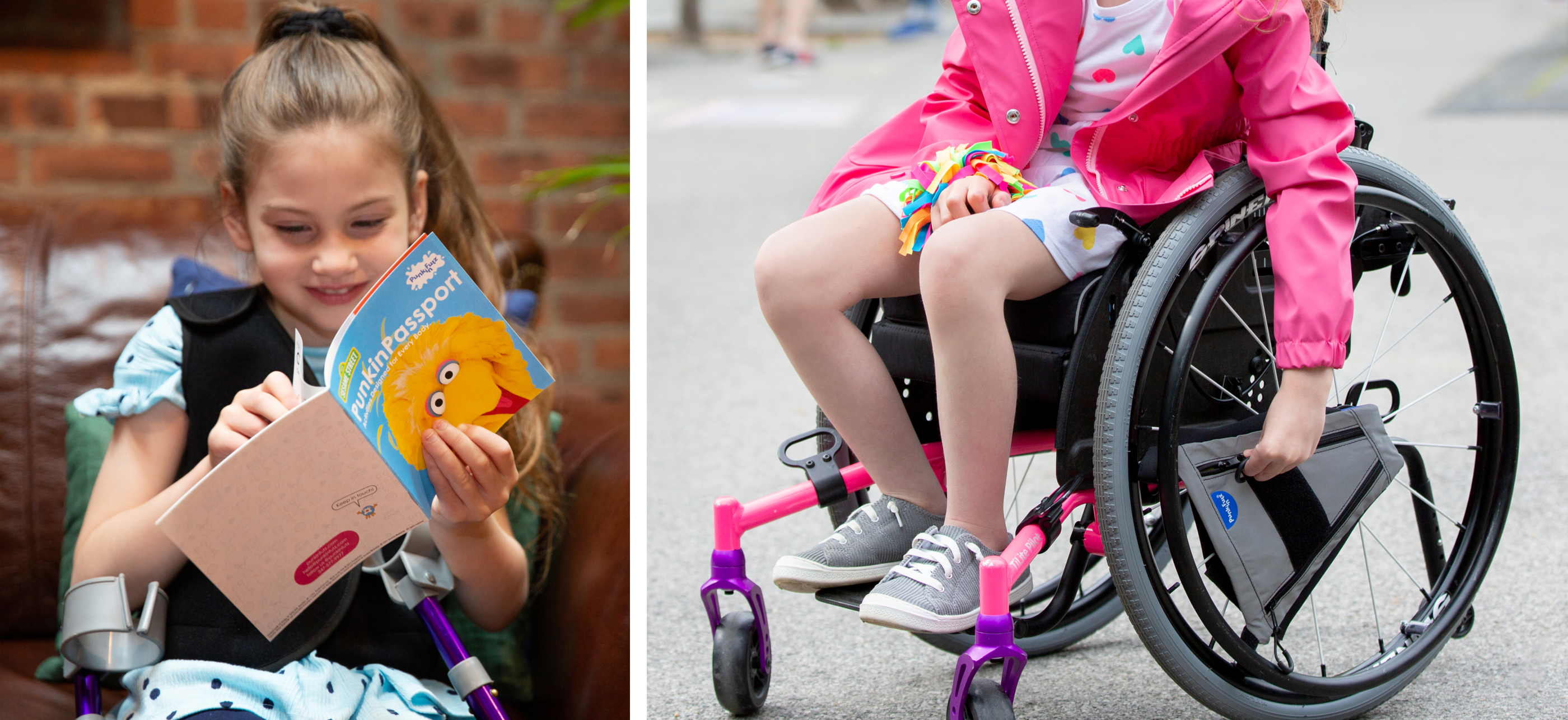
At a visit to the orthopedist, Radcliffe suggested that if children’s orthotics were made to look like superhero gear, every kid would want them. “The doctor said to me, ‘That’s a great idea — someone should do that.’”
Radcliffe knew she was that “someone.” But she had her hands full as a working mother, then serving as vice president of New York operations for CTGi, a technology and management consulting company.
The pivotal moment came when Radcliffe was offered a once-in-a-lifetime opportunity to head up a technology company. “I had been working my whole career for this kind of offer. I came home and said to my husband, ‘I don’t want to do it.’” The couple started talking, rekindling the idea of manufacturing kid-friendly orthotics.
At the time, Radcliffe was enrolled in the MBA program at Baruch College’s Zicklin School of Business. “So my husband — being the wonderfully supportive human that he is — said, ‘Go see what you can learn,’” she says. She began doing research on children’s adaptive products for a marketing class. Although she discovered that several companies were already making colorful orthotics for children, she saw a huge need elsewhere.
“The more I looked into it, the more I found that this was a whole area that was under-served and underrepresented in the marketplace,” she says.
Radcliffe made the leap from executive to entrepreneur, launching PunkinFutz with a product line of bags for children in wheelchairs and others with limited mobility. From there, the company developed a patented compression vest made of breathable fabric. “We opened ourselves to an entire sensory play world.”
Finding Your Superpower
From the beginning, one point was non-negotiable for Radcliffe and her husband: PunkinFutz would hire people from the disability community.
“When we started the company, our daughter was 20. If I were going to expect someone to employ our daughter, then I’d better be that same employer,” she says.
On the manufacturing end, PunkinFutz initially worked with Helena Industries in Montana, a cut-and-sew operation run by The Arc, a national advocacy organization for people with disabilities. “They were a tremendous partner in taking our designs and helping us refine and produce them,” Radcliffe says. “It’s hard to know how to make a bag for a wheelchair if you’re not sitting in a wheelchair. We need the lived experience of the community for whom we’re making these products.”
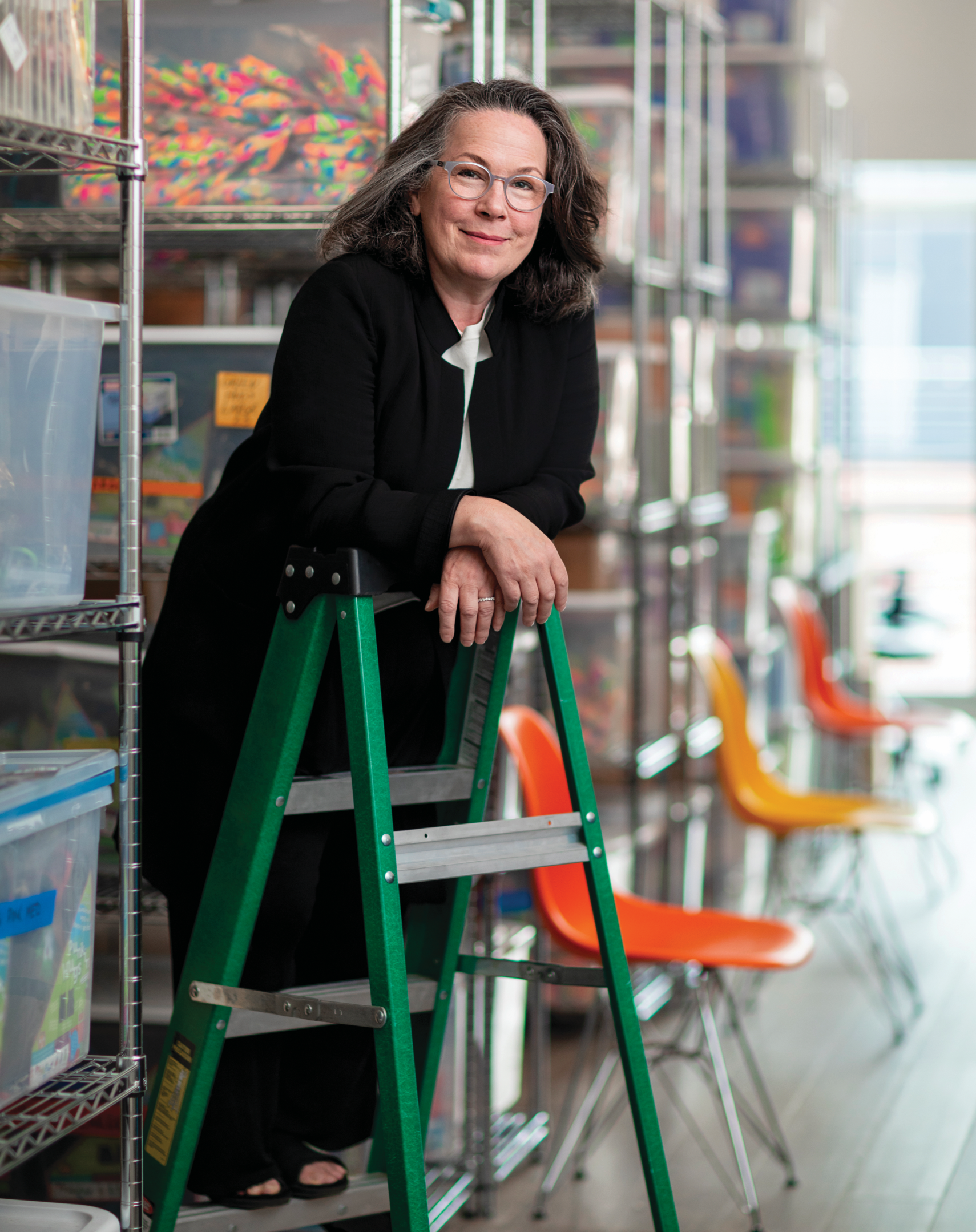
Although the COVID-19 pandemic curtailed operations at many Arc facilities, PunkinFutz continues to do a significant amount of production with Arc programs in the United States, while also moving some manufacturing overseas to meet demand.
Radcliffe’s most ambitious goal for PunkinFutz is to build an adaptive factory in New York City.
“We have a whole trajectory. I know which products we’re starting with that right now we source in places that are not adaptive. I’ve also started talking to other manufacturers who might be clients of ours,” she says.
“I know it’s expensive, I know this is the hardest place to do this. But this is where the population needs jobs,” she adds. “More than 70 percent of adults with disabilities in the city are unemployed. That’s an outrageous number.”
In keeping with PunkinFutz’s mission, the majority of the company’s office staff is also comprised of adults with disabilities.
“I have a physical disability that you can see, there’s no going around it,” says Shenik Ruiz, a Bronx native and summa cum laude graduate of Lehman College of the City University of New York. “I knew employment was going to be a struggle for me, and I was ready for it.”
Ruiz first encountered PunkinFutz three years ago at the Abilities Expo in New Jersey while working on her senior capstone project. “I gave them my business card and resume, and said if you ever have any job openings, please reach out to me. I met Lisa the next day and it’s been history ever since,” she says.
“To find a place so early in my career that fully accepts who I am and the accommodations that I need — I really appreciate that. We all do.”
PunkinFutz’s unofficial motto is “Everyone has a superpower,” and Ruiz notes that Radcliffe helps the staff to find theirs.
Ruiz, for example, expanded her responsibilities to include community outreach after Radcliffe recognized her skills in that area. She is especially proud of initiating a collaboration with the New York Public Library in Manhattan, which will serve as host for a panel on disability employment.
“In big corporations you don’t always get a chance to see someone’s superpowers and what they’re good at. Here we’re able to do that,” Ruiz says.
Tribute to a Teacher
Radcliffe’s commitment to the greater community has been a through-line in her career and life. “In the technology field, my particular area of expertise was privacy and confidentiality for disenfranchised populations, so I worked a lot on how data can be used to improve outcomes in human services,” she says.
She traces that commitment directly back to William & Mary. “There are experiences and professors I had that really changed the way I thought about the world. One in particular was a German professor — Elsa Diduk.” Diduk, renowned for her intellectual passion and force of personality, received both the Thomas Jefferson Award and the Graves Award for Excellence in Teaching during her tenure at William & Mary. She passed away in 2010.
“I had come to William & Mary with quite a bit of German, so I placed in her upper-level class my freshman year,” Radcliffe recalls. “In my first couple of weeks of college, she said things that were so challenging to me intellectually that I actually dropped the course.”
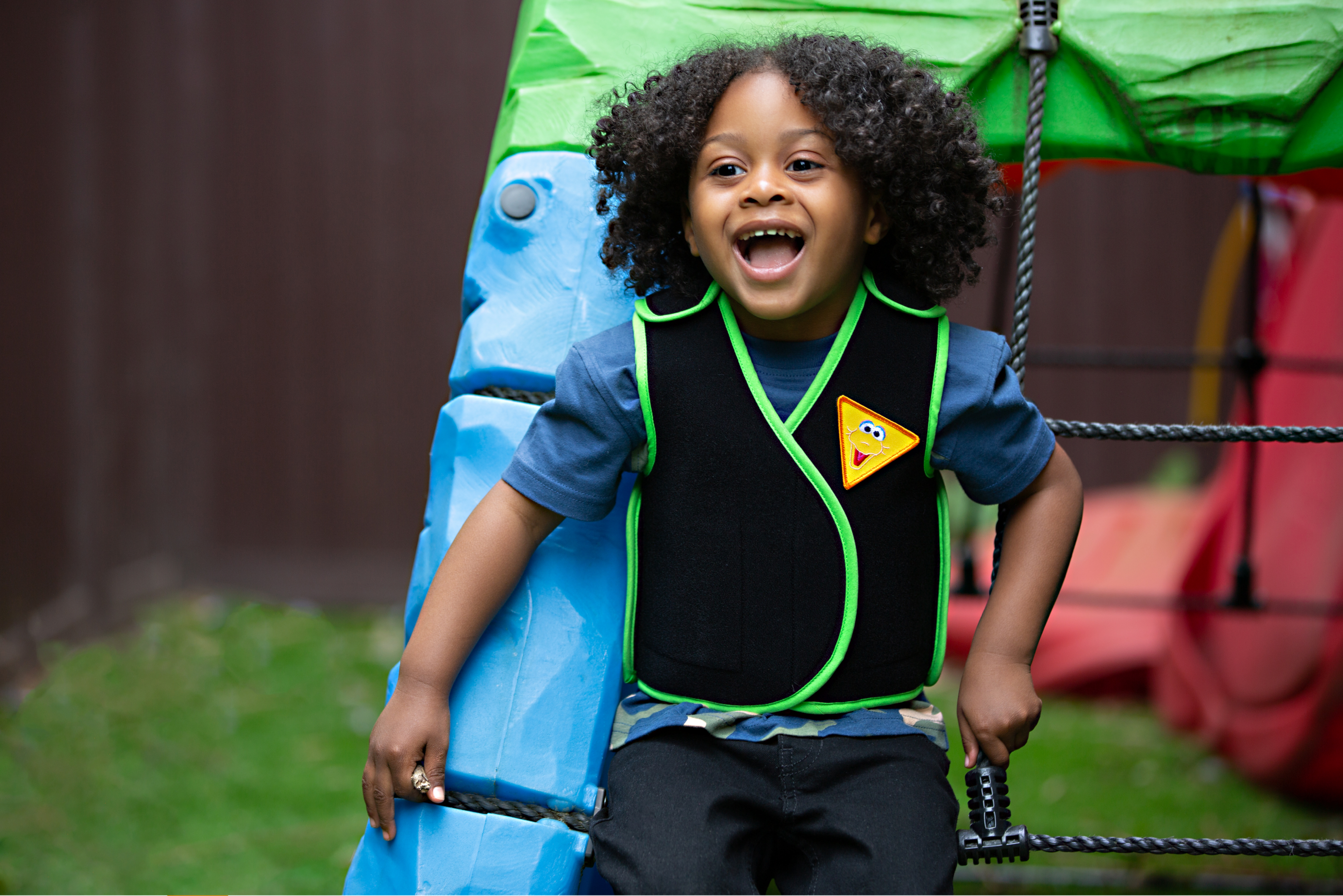
Returning to Diduk’s classroom the following semester, Radcliffe ended up taking courses with her throughout all four years of college, including an independent study her senior year.
“She considered herself an ethical humanist. She talked about the way power was used historically, and in ways I’d never considered given my particular background and upbringing. It was so eye-opening,” Radcliffe says. “To this day, I find my views align very strongly with her views that had so shocked me my freshman year. It took four years for me to be able to hear it and a lifetime to process it.”
Diduk also challenged Radcliffe on a personal level. “In my last class with her, she said, ‘Lisa, listen to me. You could go to grad school in German if you wanted to, but please don’t. You would be wasting everyone’s time. You’re not serious enough as a student. You need to decide what you really want to do in the world.’
“It was the most dead-on, important, correct, insightful thing that anyone had ever said to me,” Radcliffe says. “In so many ways, she absolutely changed my life for the better.”
Radcliffe’s greatest regret is not having the opportunity to express her gratitude to Diduk before her death. “Teachers have a huge impact on their students that often doesn’t become apparent until many years later. It’s so important to take a moment to say thank you, because you don’t always know that you’re going to get that chance.”
The Theory of Loose Parts
While Elsa Diduk inspired Radcliffe’s seriousness of purpose, Radcliffe’s father inspired her sense of fun. “He has this wild imagination. He traveled a lot for business, and he would come home and bring my brother and me imaginary friends. He would tell us who the person was, what they looked like, how they dressed, where they went to school, what their language sounded like.
“For us, the idea of play was totally second nature — that, and wonder. My dad still has it,” Radcliffe says.
“He’s in his 80s now, and my mom died several years ago, so it’s really nice that’s he gotten to hear how important he’s been. I’m fortunate to have been able to make my father aware of how much of an impact he had on my thought process.”
The playfulness of PunkinFutz products — from pom-pom fidgets to superhero capes — was a major factor in Sesame Street’s decision to partner with the company.
“We were struck by Lisa’s dedication to making sure that her own kids and kids who have similar challenges have access to products that not only address their needs, but also let them have fun,” says Jeff Chapp, Sesame’s senior director of licensing.
In designing products that spur a child’s imagination, Radcliffe subscribes to what is known as “The Theory of Loose Parts” — an idea first proposed in the 1970s by architect Simon Nicholson. Nicholson argued that materials capable of being moved around, redesigned and recombined produce far greater opportunities for creative engagement.
“If you give a child a product to play with, they’ll play with it in prescribed ways. But if you give them a box of loose parts, they’ll come up with stuff you never thought of,” Radcliffe says. “Our vest, for example, has the only play ability of any product like it on the market. The whole outside is a really soft loop fabric, so that anything Velcro® sticks to it.”
PunkinFutz makes patches and capes to accessorize the vests, and each vest also comes with a supply of Velcoin® fasteners so that children can attach their own favorite items. “One kid stuck a couple of empty plastic soda bottles on the back of the vest and pretended it was a jet pack,” she says.
Fidgets and Focus
Beginning with its first wheelchair bags, PunkinFutz has joined forces with experts — occupational therapists, educators, parents, the disability community — to ensure that every product sold by the brand is effective, durable, fun and safe.
“Pediatric occupational therapists are the secret weapon when you’re designing products for kids,” Radcliffe says. “They’re so gifted in being able to meet a child where he or she is.”
PunkinFutz employs a staff OT, Peri Pike, and Dr. Clover Hutchinson, president of the New York State Black Occupational Therapy Caucus, serves on the company’s Advisory Group.
The Dillon Child Study Center at St. Joseph’s College in Brooklyn was an early champion of PunkinFutz. Radcliffe’s son Buster had attended the school, and she kept close ties with the staff.
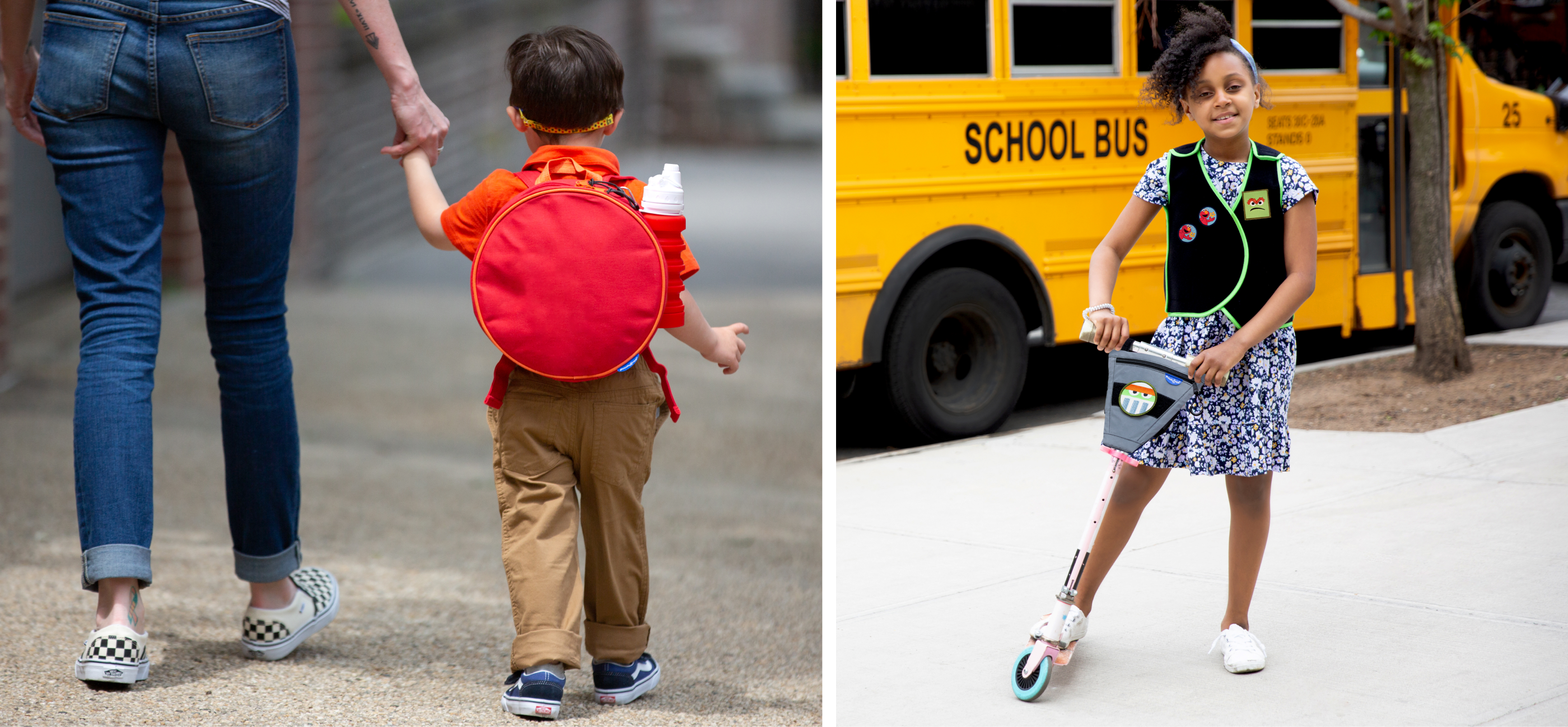
“We call our curriculum a ‘whole-child’ curriculum,” says Professor Susan Straut Collard, the center’s director and associate chair of the St. Joseph’s Child Study Department. “We work simultaneously on a child’s intellectual development, social development, motor development and language development. Lisa and her team have helped us to understand how their materials can fit into that curriculum.”
Although it may sound counterintuitive, Straut Collard says, PunkinFutz’s fidgets — pom-poms, marble mazes, water bottles and fidgets with a scratchy surface — actually help children focus, improving their learning and social skills.
“Some children are very, very anxious. Some children really need reassurance,” she says. “If we can give a child a fidget during a time of anxiety, the child can put her anxiety into the material — guiding that ball around or feeling that rough fabric — and that frees her up to interact with other children and adults in an appropriate way. It helps her to ask a question when normally her anxiety would cause her to be quiet.”
She notes that PunkinFutz products are appropriate for all children at the Dillon Center, not just those with special needs, something Radcliffe and her team have emphasized in staff training.
Straut Collard cites the example of PunkinFutz’s compression vests. “We keep them in the dress-up area and the kids will sometimes put them on because they’re colorful, they’re decorative,” she says. “If a child is having a bad day and might need to calm their body, they can make the decision to put on the vest themselves or the teacher can suggest it,” she says.
“A teacher might say, ‘Maybe you need an extra hug today,’ and the child doesn’t feel singled out, because the vest is already in the classroom,” adds Danielle Endes, the center’ assistant director and special education coordinator.
Some products are just plain fun, Straut Collard says — like Velcro® PunkinPitch balls, which promote motor development. “Who doesn’t love throwing things?”
How to Get to Sesame Street
The launch of PunkinFutz’s Sesame Street line promises to be a game-changer for the company. For Radcliffe, the partnership made sense both from a business standpoint and from a values perspective.
“It seemed like the timing was just right, to focus on back-to-school for 2021 — to take that trusted Sesame character line and pair them with sensory products that help children to calm and focus,” Radcliffe says, noting the tremendous stress that the pandemic has placed on children.
The genesis of the partnership sprang from a gathering Radcliffe attended at Sesame Street, sponsored by the organization Women in Toys. “They played a couple of videos about what Sesame Street was doing in the world. I had no idea how much of a global impact they had. And I was so struck by it,” she says. “I thought that if we were ever to do licensing, their mission so fits with ours — it’s about human values and the value of play for children.”
When the company reached the point about a year ago when it was ready to consider licensing, Radcliffe had a friend working at Sesame Street who was able to make introductions.
“We were so impressed that Lisa had built this brand. It was something we really hadn’t seen before, and we wanted to complement it with a Sesame touch,” says licensing director Jeff Chapp. “For people who already use PunkinFutz products, we thought it would be a great way for those kids to express their joy of Sesame and what they love about our characters by being able to accessorize the vests or wheelchair bags.”
PunkinFutz’s Sesame products, sold as part of JCPenney’s new adaptive line, include sensory and active child sets packed with a variety of fidgets and a coloring book, Elmo reward stars and collectible character patches, and bags for manual and motorized wheelchairs that can also be used on bikes, walkers or scooters.
“Sesame’s Streets focus, in a few simple words, is that we want to make sure that we can help kids grow smarter, stronger and kinder. Partnering with PunkinFutz is a no-brainer for us,” Chapp says. “I think we’re even more excited to work with Lisa than she is with us.”
A Joy Forever
The COVID-19 pandemic has reinforced not only the importance of PunkinFutz’s products, but also the importance of its work providing support to the disability community. To that end, Radcliffe and her husband have established a nonprofit offshoot of PunkinFutz called Power by Inclusion.
Among their goals is addressing the need for more occupational therapists and special education professionals to serve communities of color, building on a partnership the company began with the New York State Occupational Therapy Association last year.
As PunkinFutz grows, Radcliffe is aware that she will need to delegate responsibility for many aspects of the operation. Her vision is clear, however.
“Wherever our employees are, that’s where I want to be. I tell people this is purely selfish on my part,” she says. “The greatest single joy I have ever gotten in my entire life is being able to work with our team. It’s absolutely unbelievable.”
